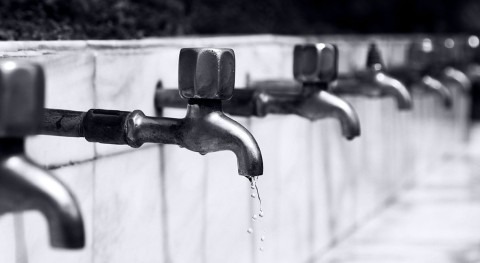The devastating water crisis facing Jackson, Miss., shines a light on years of inadequate funding and neglect of U.S. drinking water infrastructure, and the terrible consequences that often disproportionately harm communities of color.
The majority Black state capital of more than 150,000 people is grappling with a water system that failed last week, leaving the city unable to provide the basic necessity of clean drinking water. Residents are being given bottled water, but even those supplies are starting to run out. Some water was flowing through the system as of Friday for fighting fires and flushing toilets, but with the abysmal warning of telling people to shower with their mouths closed, and not drink or cook with the water.
“This awful situation comes as no surprise. What we’re seeing is a criminal lack of attention and, especially, money flowing to our tap water infrastructure. What’s happening in Jackson is yet another warning about the decrepit state of drinking water systems across the U.S. It’s a matter of when, not if, others will also suffer,” said Ken Cook, the Environmental Working Group’s president and co-founder.
President Joe Biden on August 30 declared a state of emergency for Mississippi, a vital move to send federal funds and other resources to help alleviate hardship for the thousands affected.
Insufficient and badly managed funding is the reason for the familiar tale of failing drinking water infrastructure systems. EWG has long warned that too-little funding to maintain and improve systems can lead to massive spikes of contaminants of concern in drinking water. EWG’s Tap Water Database was created for the purpose of drawing attention to the state of systems across the U.S.
“This latest crisis illustrates the far-reaching consequences of our long-term underinvestment in drinking water infrastructure,” said Olga Naidenko, Ph.D., vice president for science investigations at EWG. “But only the federal government has enough money to make the massive investment that’s needed. Local governments can’t do it themselves.”
The Brookings Institution think tank has long warned about haphazard infrastructure funding, publishing a report in 2016 that found most major cities across the U.S. face difficulties with their water utility finances. Echoing the report’s conclusion, Brookings Institution fellow Joseph Kane told Marketplace Morning Report on September 2 that the Jackson crisis shows how water “infrastructure, similar to other infrastructure systems, like transportation, energy, for decades, has just not received durable and predictable funding.”
Biden last year signed a major bill, the Bipartisan Infrastructure Law, which dedicates more than $50 billion to improve drinking water, wastewater and stormwater infrastructure. It’s the biggest single investment in infrastructure, but history shows states often misspend these funds. Mississippi Rep. Chris Bell (D) said last year, during another water crisis in Jackson, that the city rarely gets its fair share of federal infrastructure dollars, no matter how much funds increase.
And that $50 billion is just a drop in the bucket, a fraction of the $472.6 billion the EPA said in 2018 is needed to “maintain and improve” drinking water infrastructure for the next 20 years.
It’s an argument many commentators online are raising in the present catastrophe, attacking Gov. Tate Reeves and the Mississippi Legislature for siphoning off critical infrastructure funds to wealthier, white neighborhoods. “Their water system is failing because of years of neglect. This is environmental racism,” tweeted NBC news tech and culture reporter Kat Tenbarge.
Jackson’s water system has long faced problems due to underinvestment in aging infrastructure, which is not designed to cope with extreme weather caused by the climate crisis. In March, the Environmental Protection Agency announced the city’s water system was potentially harmful to residents, and the mayor said the issue is decades old. In July, the city issued a boil-water advisory, which lasted through August 29, when a storm knocked the entire system offline.
“It’s unconscionable that this is happening,” said Cook. “But until we put money into our aging, failing water infrastructure, we’re just sitting ducks, waiting for the next Jackson.”
EWG’s Naidenko says recent results of a survey of visitors to the Tap Water Database show more than 50 percent of participants believe their drinking water is unsafe, but there’s widespread confusion about who could fix the issue, and potential solutions. “There must be greater federal funding that gets spent wisely in communities most at need,” she said.
In 2021, EWG scientists developed a framework for calculating the long-term health risks of poor drinking water quality. It is intended to show how information like race and ethnicity can be used to assess cumulative cancer risk from tap water contamination in communities already under threat from environmental inequities.



















